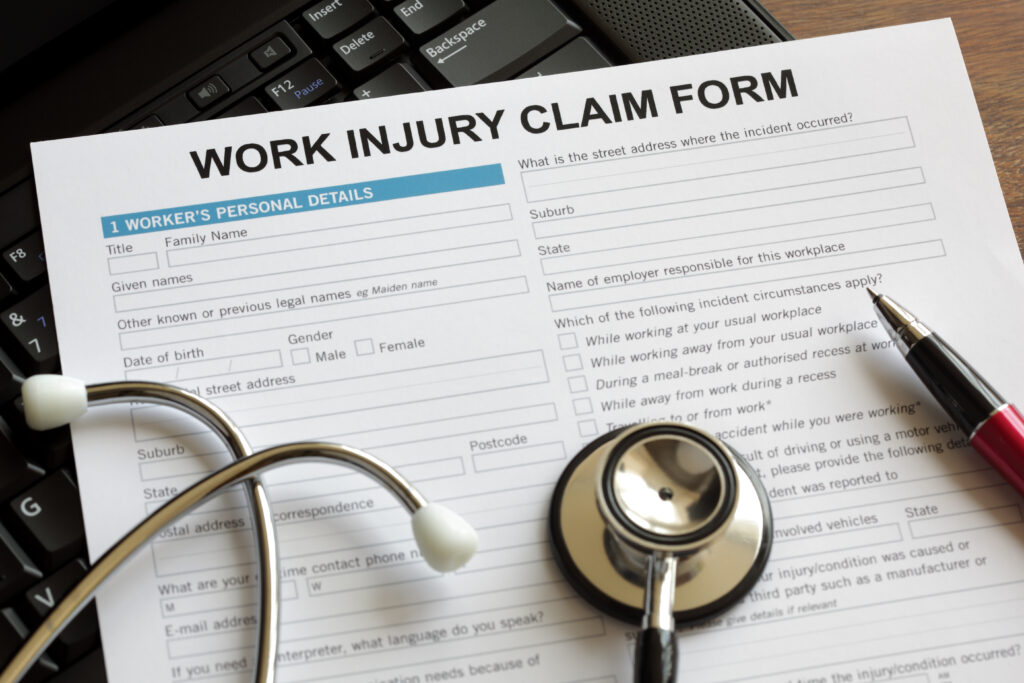 When you’re injured at work or receive a diagnosis for a work-related medical condition, you feel devastated. Not only do you have to face treatment for your injury or illness, but everything else that comes with it, including missing work, financial burdens, and sometimes, even the thought of not returning to work as you once did
When you’re injured at work or receive a diagnosis for a work-related medical condition, you feel devastated. Not only do you have to face treatment for your injury or illness, but everything else that comes with it, including missing work, financial burdens, and sometimes, even the thought of not returning to work as you once did
Fortunately, injured and ill workers can file a workers’ compensation claim. Workers’ comp can help ease some of the expected stresses by offering valuable benefits and compensation to get you through the rough times.
After filing your workers’ comp claim and before receiving your decision, you can keep up with your claim by checking the status. Because every state’s system is different, a skilled Philadelphia workers compensation lawyer can assist.
Get A Free Consultation Today!
Workers’ Compensation – What It Is and How It Works
If you’re new to workers’ comp or have never had to file a claim, you may not know what the insurance is and how it works. When you’re covered by workers’ compensation, it’s particularly helpful to become familiar with the insurance program and understand what it can do for you in the event of a work-related accident or injury.
What is Workers’ Compensation?

Workers’ compensation, also known as workers’ comp or workman’s comp, is a special type of government-mandated insurance employers carry to protect their employees in case of an occupational-related injury or illness. If you’re hurt at work, you can file a claim to obtain benefits and compensation.
49 out of 50 states require employers to carry workers’ compensation insurance – Texas is the only state that makes it optional. Every state’s workers’ compensation insurance varies a bit, as the state agencies are in charge of dictating the types of injuries covered, the amount of available benefits, and how the benefits are conferred onto claimants.
Workers’ comp offers multiple types of benefits to injured and sick workers, like coverage for medical bills and lost income. Additionally, worker’s compensation offers death benefits to surviving family members of workers who pass away due to their occupation.
Advantages of Workers’ Compensation Insurance
Workers’ compensation is advantageous to both employers and employees.
For employees, workers’ compensation provides a simpler, more efficient way to obtain compensation after an accident or medical diagnosis. Instead of having to file a lawsuit against their employer and go through the motions of the legal process, a workers’ comp claim can help employees get the money they need quicker with less hassle.
By offering workers’ comp coverage, employers shield themselves from liability. Therefore, if an employee suffers an injury or becomes ill at work, they don’t have to worry about legal consequences.
It is worth noting, though, that while employees do not have a right to sue their employers, they may have the right to sue third parties. If a party that is not your employer plays a part in causing your harm, you may have the opportunity to sue to recover additional compensation for your losses.
Types of Workers Who Receive Protection Under Workers’ Compensation
Workers’ compensation insurance covers a wide variety of employees. In general, most full-time employees receive workers’ comp protection. In some cases, part-time and seasonal employees may also be covered under workers’ compensation.
Some states have laws excluding certain types of workers that don’t qualify for insurance protection, including:
- Casual workers
- Independent contractors
- Business owners and sole proprietors
- Corporate officers
- Farmers and farmhands
- Railroad workers
- Maritime workers
- Volunteers
Additionally, a small number of states require employers to offer workers’ compensation if they have a certain number of employees. For example, in Florida, only employers with four or more employees need to purchase workers’ comp insurance.
Injuries and Illnesses Covered By Workers’ Comp
Workers’ compensation covers a wide variety of injuries and medical conditions. The important detail you must prove in your claim is that your injury or illness was caused by your occupation and arose from your job function.
If the injury or condition is not related to your job, workers’ compensation is not likely to cover it. In addition, workers’ comp does not cover injuries that arise under certain circumstances, such as when a worker violates the law, is outside of the workplace at the time of the accident, or suffers harm as a result of intoxication.
Benefits Offered By Workers’ Compensation Insurance

If you become injured or ill because of your occupation, workers’ compensation insurance can help provide for you financially. You may qualify for several types of benefits, including, but not limited to, the following.
Medical Expenses
Medical care is usually needed to adequately treat your work-related injury or condition. But unfortunately, treatment is costly, and medical bills can quickly pile up. Workers’ compensation covers medical expenses to ensure you can get the treatment you need to recover as much as possible.
Income Replacement
Suffering harm at work can mean taking time away from your job. This can have detrimental consequences, as you cannot make a living and provide for yourself and your family.
Workers’ comp provides some income replacement to relieve some of the financial pressures brought on by your condition.
Ongoing Treatment
Depending on the severity of your injury, you may require treatment in the future. Workers’ comp can provide compensation to cover your ongoing treatment, like therapy and rehabilitation.
Disability Benefits
When an injury or condition leaves you disabled, whether for a short time or for good, workers’ compensation provides benefits to cover your resulting losses.
The extent of your benefits depends on the exact type of disability your physician deems you’re suffering, including temporary or permanent disabilities, whether partial or total. Doctors can also classify your disability as mild, moderate, marked, or total.
Vocational Rehabilitation
Based on the details of your injury and recovery, you may not return to work in the same capacity as before. When this happens, vocational rehabilitation can help prep you for other occupations that suit your new needs, as well as find and maintain a new job.
Filing a Workers’ Compensation Claim
States generally follow the same requirements when filing workers’ comp claims. It’s critical to follow the exact steps to follow your claim, as failing to satisfy the requirements can have a negative impact on your ability to receive benefits or compensation for your injuries.
Get Medical Attention
Regardless of the situation, you should always put your physical health and well-being first. If you suffer an injury during a workplace accident and require immediate care, call 911 or go to an emergency room right away. Even if you don’t believe your injuries require emergent help, you should still get medical attention as soon as possible.
Medical conditions are a bit different, as they’re not typically caused by a singular event or accident. However, if you feel something is off with your health, do not wait to seek medical attention and a proper diagnosis.
Report Your Injury or Condition to Your Employer
Reporting your injury or illness to your employer is one of the most important steps you can take. Before filing your claim, you must notify your employer as quickly as possible of what occurred.
State law varies regarding how long employees have to report their injuries to their employers, but typically ranges from 30 days to a year. Even so, you should not wait to discuss the situation with your employer, as waiting can have a damaging impact on your claim.
File Your Workers’ Comp Claim

Typically, your employer provides paperwork you must fill out and return for them to send to their insurance company. Be sure to complete the forms entirely and accurately and provide supporting documentation.
In some states, though, employees are also required to file their claim with the state workers’ comp agency. Therefore, becoming familiar with your state’s workers’ comp filing procedure is essential to avoid missing any critical step, as this can delay your claim or result in a denial.
Consult with a Workers’ Compensation Attorney
At some point during the workers’ compensation claim process, you should consult with an experienced workers’ compensation attorney. The sooner you meet with a lawyer, the better, as they can provide much-needed guidance and advice throughout the process.
What Happens After You File a Workers’ Comp Claim?
After you file your workers’ comp claim, the insurance company investigates. They’ll review all of the information and documentation you’ve provided and determine how to proceed with your claim. Should they require more information to make a determination, they’ll reach out to you.
The insurance company typically sends out an approval or denial within two to four weeks, but there may be some delays depending on the circumstances. In some states, if a decision is not rendered within a specific deadline, the claim is automatically deemed approved.
How to Check the Status of Your Workers’ Compensation Claim
Once you’ve filed your workers’ comp claim, at some point, you may want to check the status. Checking the status of your claim is usually fairly easy but often depends on your state’s procedures.
If you filed your claim through your employer, asking your employer about your claim is unlikely to yield any answers, as they are not likely to keep track of it. Instead, you can try contacting their insurance provider directly. When you contact them, have certain information ready to retrieve your claim more easily, including your information, your employer’s information, and any claim number you may have.
If you’re required to file a claim through your state’s workers’ comp agency, these agency’s websites often have portals where you can check the status of your claim. You can also contact the agency directly for more information.
Additionally, you can rely on your workers’ compensation attorney to look into your claim for you. Workers’ comp attorneys have many resources at their disposal, making it particularly easy for them to provide information concerning the status of your claim.
Experiencing Delays with Your Claim
Certain issues can delay your claim, causing you to wait longer for a decision. Some of the common problems causing workers’ comp claim delays include:
- Paperwork errors: Mistakes and omissions in your claim paperwork can cause your claim to take longer, as you’ll need to correct these errors or submit additional information before the insurance company can proceed.
- Employer delays: Your employer must usually submit documentation to the insurance company, and if they fail to do so timely, this can delay your claim.
- Insurance company issues: The insurance company can contribute to delays for various reasons, including administrative errors, understaffing, and attempts to negotiate unreasonable settlement amounts.
It’s not uncommon to experience some delays with your workers’ comp claim. Nonetheless, a workers’ compensation attorney can help correct any concerns and ensure your claim moves along and you receive a decision as quickly as possible.
Receiving a Decision Concerning Your Workers’ Comp Claim

Once you receive your claim decision, you may be content, underwhelmed, or upset by the results.
If the insurance company approves your claim, you don’t need to do anything else. You can expect to begin receiving your benefits shortly thereafter.
Should you receive a claim denial, don’t panic – you have options. You can appeal the decision following your state’s appeals process and pursue a more favorable result.
It is commonplace for workers’ comp claimants to experience difficulties with their claims, including denials and insufficient settlement offers. When you face obstacles with your claim, you can rely on a workers’ comp attorney’s knowledge and experience as they represent your best interests for a more favorable outcome.
Getting Through the Workers’ Compensation Claims Process
The process for a workers’ comp claim can be overwhelming and confusing. The good news: you don’t have to do it alone.
When you’ve suffered harm on the job, do not hesitate to seek legal representation. A workers’ compensation attorney can work with you from beginning to end to assist in reaching the most beneficial result.
Case evaluations are free, and a workers’ comp lawyer can benefit you at any stage of the process. Reach out today for more information.
